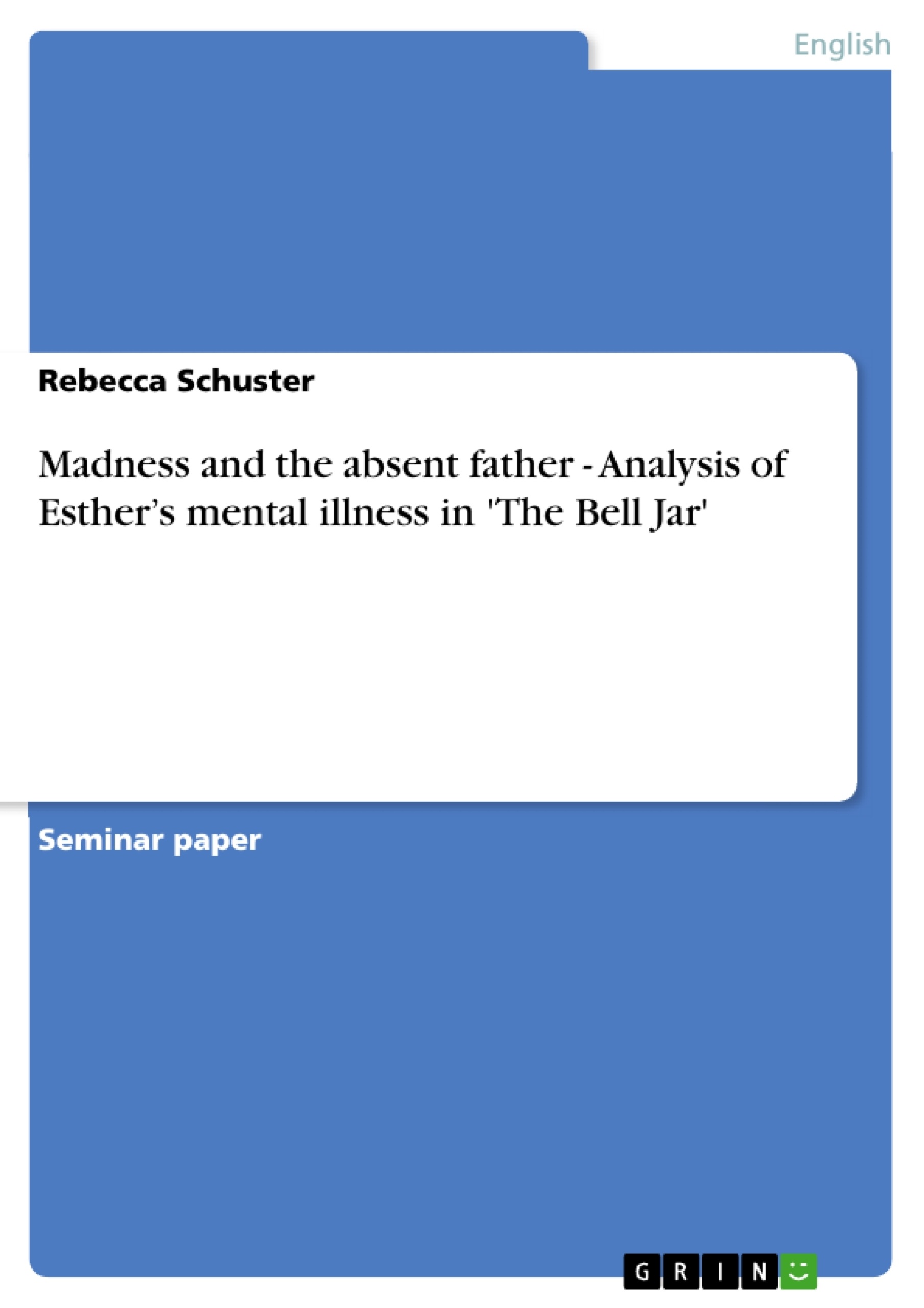The following essay deals with the book The Bell Jar by Sylvia Plath. It will try to show that Esther’s madness is profoundly linked to her social environment. This on the other hand is in several ways deeply connected with Esther’s loss of her father in her childhood. That is, the absence of her father correlates with Esther’s behaviour towards her surroundings and her life attitudes.
To prove that fact this essay will try to work out the turning point in Esther’s life that leads to the final break-out of her illness and her mental spiral down movement that leads her into a psychiatric institution.
1. DIAGNOSIS
Esther suffers from a severe case of depression that might have been caused by a genetic defect; but as opposed to Sylvia Plath, from who is known that in her family were reported cases of depression on her father’s side , one finds only insufficient hints (that really only serve as foreshadows for the things to happen in the story) that the same is true for Esther, for example her comment about her father’s provenance: “My German-speaking father, dead since I was nine, came from some manic-depressive hamlet in the black heart of Prussia.”
The reader, who does not know about the book’s autobiographical background and Plath’s medical history, must consequently assume that Esther’s worsening disease is entirely caused by her social environment.
This notion is not devious at all.
Inhaltsverzeichnis (Table of Contents)
- Introduction
- Diagnosis
- Social Origins of Depressions
- The Turning Point
- Detrimental Men
- Invidious Mother and Adjuvant Women
- Psychoanalytical Approach: Electra Complex
Zielsetzung und Themenschwerpunkte (Objectives and Key Themes)
This essay analyzes the book "The Bell Jar" by Sylvia Plath, focusing on the relationship between Esther's mental illness and her social environment, specifically exploring the impact of her father's absence on her life and behavior.
- The impact of social environment on mental health.
- The influence of childhood experiences on adult behavior.
- The role of family relationships in shaping mental well-being.
- Exploring the complex relationship between personal experiences and social pressures.
- Analyzing Esther's descent into mental illness through a psychoanalytic lens.
Zusammenfassung der Kapitel (Chapter Summaries)
- Introduction: This chapter introduces the essay's focus on the connection between Esther's mental illness and her social environment, highlighting the significance of her father's absence.
- Diagnosis: This chapter examines Esther's severe depression and explores the potential influence of both genetic predisposition and external factors, specifically drawing upon the work of Brown and Harris in "Social Origins of Depressions". The chapter establishes the argument that Esther's depression was at least partially fueled by her social surroundings.
- The Turning Point: This chapter analyzes the pivotal moment in Esther's life that marks the onset of her mental breakdown. It focuses on a specific scene where Esther experiences a sense of isolation and disconnection from her surroundings, interpreting this as a key turning point in her mental deterioration.
- Detrimental Men: This chapter analyzes the role of men in Esther's life and their potential contribution to her mental decline. It explores the influence of men, such as Buddy Willard and the other men she encounters, on her mental well-being.
- Invidious Mother and Adjuvant Women: This chapter examines the complex relationship between Esther and her mother and the influence of other women in her life. It explores the role of maternal figures and their potential impact on Esther's mental state.
Schlüsselwörter (Keywords)
The primary keywords and focus topics of this essay include: Sylvia Plath, The Bell Jar, mental illness, depression, social environment, childhood experiences, father's absence, Electra Complex, turning point, isolation, social pressures, family relationships, psychoanalytic approach, and the impact of external factors on mental health.
- Citation du texte
- Rebecca Schuster (Auteur), 2005, Madness and the absent father - Analysis of Esther’s mental illness in 'The Bell Jar', Munich, GRIN Verlag, https://www.grin.com/document/53182



